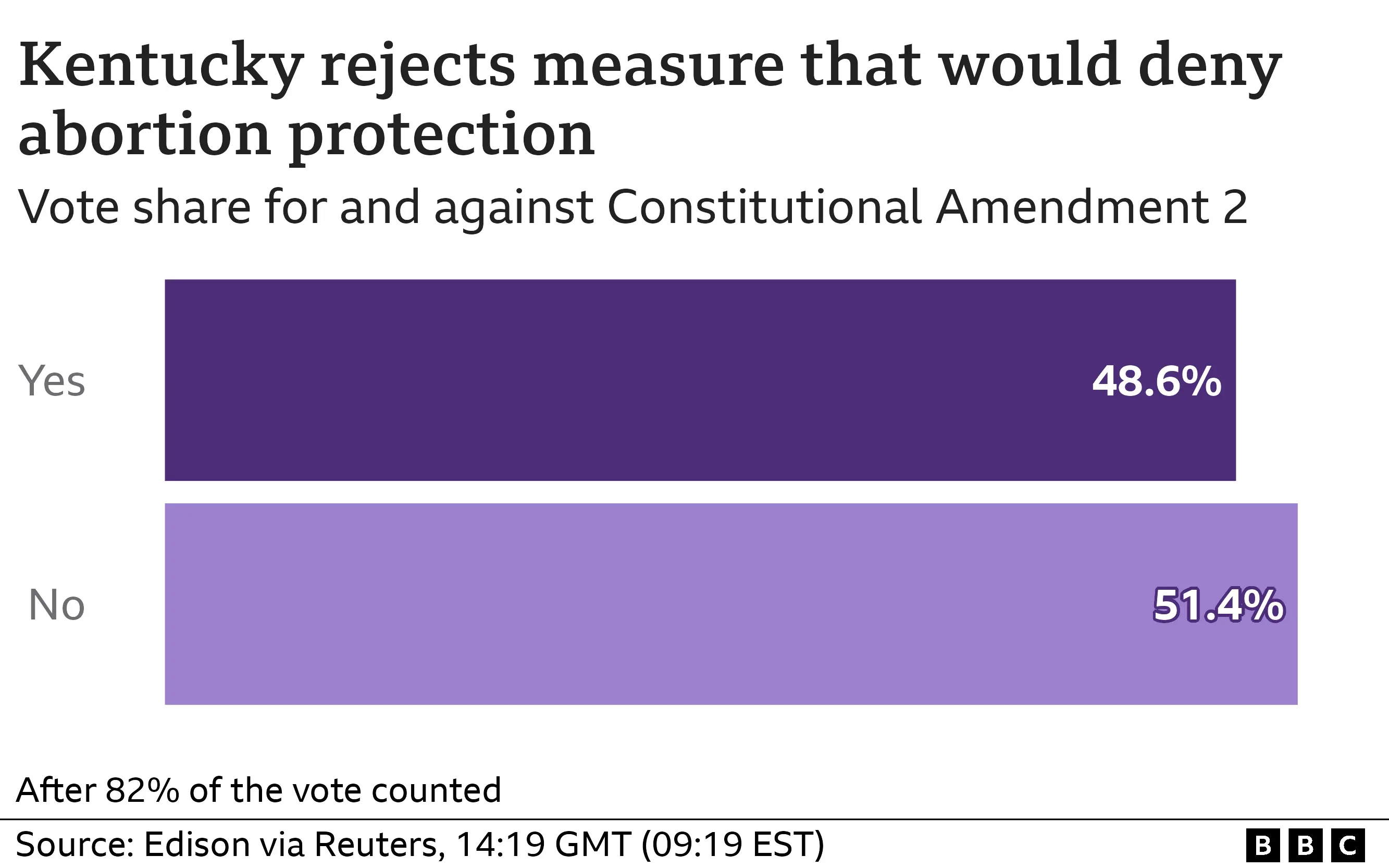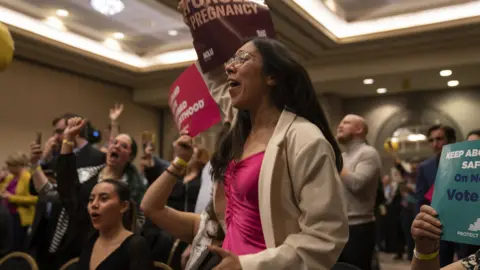Abortion election results: Kentucky rejects constitutional amendment on abortion
 BBC
BBCKentucky has rejected a constitutional amendment that would have said there was no right to abortion.
The result here follows three other pro-choice victories in this year's midterm elections: Vermont, Michigan and California have all enshrined the right to abortion in their constitution.
However, in Kentucky the result won't automatically reverse the state's current legislation, which almost entirely prohibits abortion.
The wave of ballot initiatives - which were voted on alongside other midterm elections - comes on the heels of the June Supreme Court decision to overturn Roe v Wade, ending a national guarantee to abortion access.
In a hotel ballroom in downtown Louisville, Kentucky hours before the results came through, pro-choice advocates milled around, exchanging small talk and nervous smiles, the roomed flanked by bright yellow balloons, emblazoned with the words "Bans off our bodies".
Soon after polls closed on Tuesday night, the mood began to shift. Party-goers danced and celebrated, voices raising slowly, until they reached a deafening cheer as vote projections were announced. As returns trickled in, it became clear they would win, defeating a ballot measure that would have explicitly removed abortion rights from Kentucky's constitution.
"Abortion is a winning issue," said Elizabeth Nash, a policy analyst with the Guttmacher Institute, a pro-choice research group. "Voters want people to have bodily autonomy and agency over their lives. That is pretty core to being an American."
One more ballot initiative, in Montana, is yet to be called. Voters there were asked to decide on a so-called "born alive" measure that would penalise medical staff if they don't provide life-saving care to infants born at all stages of development, including in very rare cases when a live birth occurs after induced abortion.
This is the highest number of ballot initiatives ever held on abortion in a single US election, following the Supreme Court's decision earlier this year to overturn Roe v Wade - ending the federal guarantee of abortion rights.
Now, 13 states ban abortion in most cases and others seriously restrict access.
Combined, these five ballot initiatives may change abortion access for millions of people in America. They have also acted as tests of Americans' support for abortion rights, and the extreme bans that have come into place since the fall of Roe.
So far, at least, pro-choice advocates can claim a resounding victory.
Across the country on Tuesday, one in four voters said abortion was their top issue when deciding how to vote, according to a Reuters exit poll. And according to Pew Research, 61% of Americans think that abortion should be legal in all or most cases.

Taken together, the results from Vermont, Michigan, California and Kentucky will be a significant blow to members of the anti-abortion movement, which has flooded state legislatures with abortion bans since the end of Roe.
"Ballot initiatives are tricky, you have to educate voters on unique language - that language can be the death blow sometimes," said Kristan Hawkins, president of Students for Life of America - one of the largest anti-abortion organisations in the country.
Ms Hawkins said her focus would stay on changing state laws, saying her "dream" legislation was that of Oklahoma - where abortion is effectively unavailable.
The pro-choice victory did not automatically reverse abortion bans that have gone into effect since the Supreme Court overturned Roe v Wade.
But a pro-choice vote will strengthen the case for looming legal challenges to the state's two bans. Next week, on 15 November, lawyers with Planned Parenthood and the American Civil Liberties Union (ACLU) will be in court.
"This was step one in the process," said Amber Duke, director of the Kentucky ACLU. "We'll be in court next week, and this was a key piece for us to be able to keep up that fight."

Like in Kansas - where a similar ballot initiative was emphatically defeated - the pro-choice campaign was an uphill battle. Kentucky is a solidly conservative state, where three-quarters of adults identify as Christian, nearly 50% Evangelical and 10% Catholic - two denominations that condemn abortion.
Anti-abortion Republican Rand Paul is projected to win his seat, and be re-elected, against Democratic challenger Charles Booker.
"It's kind of hard to ignore who our senators are, but they don't speak for all of us," said Erin Smith, Executive director of Kentucky Health Justice Network. "This is people's bodies."
Photographs by Alexandra Ostasiewicz




